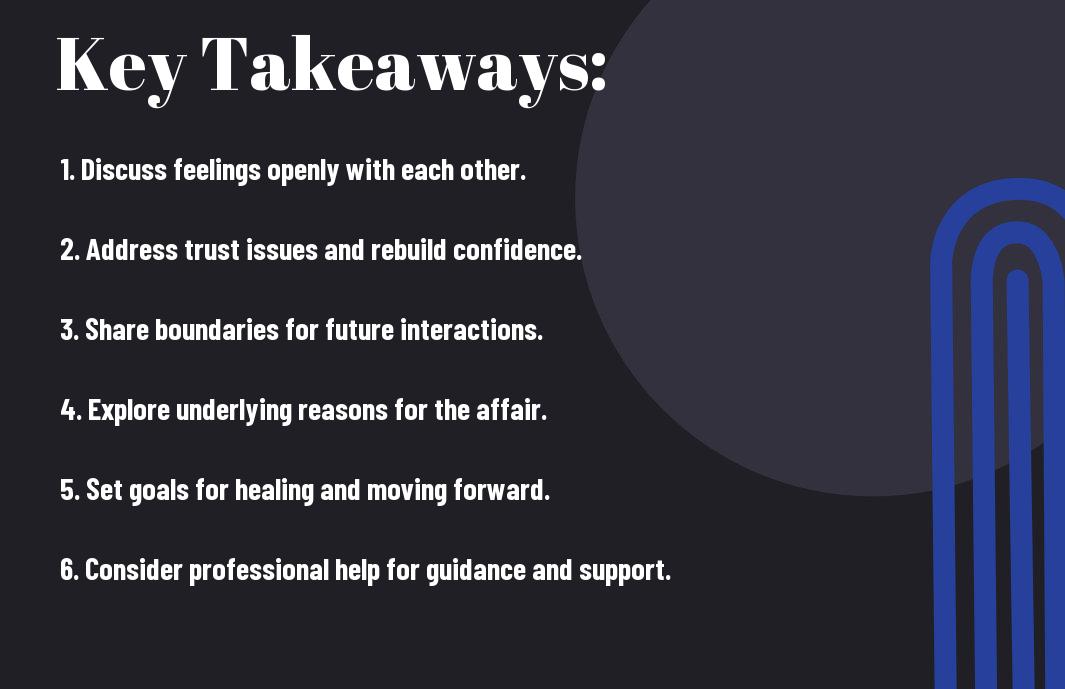You may find it challenging to navigate the aftermath of an affair, but having the right conversations can pave the way towards healing and trust. Understanding what to discuss and how to express your feelings is crucial for both you and your partner. This blog post will guide you through five key conversations that will help you rebuild your relationship and foster a deeper understanding of each other’s feelings and needs. By engaging in open dialogue, you can create a foundation for moving forward together.
Key Takeaways:
- Effective communication is vital in healing after an affair; open dialogue can foster understanding and rebuild trust.
- Have a conversation focused on the emotions involved; both partners should express how they feel and why they felt that way.
- Discuss boundaries moving forward; establishing clear boundaries can help prevent similar issues in the future.
- Talk about the impact of the affair on both partners; recognizing the emotional toll can help each person process their feelings.
- Address the reasons behind the affair; understanding the underlying causes can lead to long-term solutions and growth.
- Keep the lines of communication open; ongoing discussions encourage transparency and can help mitigate future misunderstandings.
- Consider seeking professional help; therapy can provide a guided environment for difficult conversations and emotional healing.

Understanding the Impact of Infidelity
After an affair, the emotional landscape of your relationship is profoundly altered. It’s imperative to recognize that infidelity can lead to feelings of betrayal, anger, and deep sorrow for both partners. As you navigate these tumultuous waters, you may find that communication is key to understanding one another’s pain and rebuilding the connection that has been compromised. Taking the time to address these emotions openly can lay the groundwork for healing and possibly even a stronger relationship moving forward.
Emotional Consequences for Both Partners
Behind the facade of infidelity, both partners suffer in various ways. The betrayed partner often experiences profound grief, characterized by feelings of insecurity, shame, and isolation. Meanwhile, the partner who committed the betrayal grapples with guilt, regret, and potential self-loathing. This shared emotional turmoil demands a sensitive approach to communication, as both of you must express your feelings honestly while seeking understanding and compassion from one another.
The Role of Trust in Relationships
Impact of infidelity on trust can be devastating, making it one of the most challenging aspects to address in your relationship. Trust serves as the foundation of any partnership, and once broken, rebuilding it takes time and effort. You may find that both partners must engage in difficult conversations about boundaries, honesty, and accountability. It’s important that you are willing to establish new agreements and communicate openly to avoid repeating past mistakes. And as you work together to restore your connection, remember that transparency, patience, and genuine effort will be your most valuable tools in the journey toward healing and rekindling the trust that has been lost.
The Initial Conversation: Acknowledging the Affair
Any effective healing process begins with transparency. It’s imperative that you address the affair head-on, creating a space where both partners can speak openly and honestly. You can learn more about Communication after an affair to equip yourself with the right tools for this pivotal moment. Acknowledging what happened lays the groundwork for rebuilding trust and understanding in your relationship.
Setting the Scene for Honest Dialogue
The foundation of any meaningful conversation begins with a safe environment. Choose a private setting where both of you can express your thoughts without interruptions. It’s vital to make sure that both feel comfortable and secure, allowing for a candid discussion. Establish ground rules, such as no shouting or interrupting, to facilitate a calm and productive dialogue.
How to Express Feelings without Blame
After acknowledging the affair, it’s important to communicate your feelings without pointing fingers. This technique allows both partners to share their perspectives without creating defensiveness.
Setting the tone for this conversation involves using “I” statements to express your emotions. For instance, instead of saying, “You made me feel betrayed,” discuss how the situation affected *your* feelings, such as “I felt hurt and sad when I learned about the affair.” This method promotes a more open exchange and reduces the likelihood of escalating tension. Focus on your emotions and experiences rather than blaming your partner, reinforcing an understanding that both of you must work together to move forward.
Discussing Boundaries Moving Forward
Unlike before, rebuilding trust after an affair requires clear and defined boundaries. You and your partner need to engage in an open dialogue about what behaviors are acceptable moving forward. This not only fosters safety but also allows both of you to express your needs and expectations. Establishing these boundaries is vital for rebuilding your relationship and ensuring that similar hurt does not happen again.
Establishing New Relationship Agreements
With every relationship, it’s important to create agreements that reflect the values and priorities of both partners. Take time to discuss what you both need to feel secure. Define your expectations regarding communication, spending time apart, and interactions with others to ensure a sense of respect and understanding as you navigate this new chapter together.
The Importance of Transparency
Between you and your partner, transparency acts as a shield against future infidelity. It’s important to share your feelings openly and honestly, addressing any insecurities or concerns as they arise. Due to the fragile nature of your trust, both of you should commit to being open about your emotions and activities. This way, you can nurture honesty and strengthen your bond, preventing misunderstandings that could lead to another betrayal. By keeping communication lines open, you cultivate a safe environment to express your needs and challenges, vital for healing and moving forward together.
Exploring the Path to Forgiveness
Once again, you find yourself at a crossroads in your relationship, contemplating the possibility of forgiveness. This journey is not linear; it involves deep emotional work and requires both partners to engage wholeheartedly. It’s important to acknowledge the hurt while also looking ahead toward healing and rebuilding trust. You must embrace vulnerability and openly discuss feelings, acknowledging that while the pain is real, forgiveness can pave the way for a renewed connection if both parties are willing to put in the effort.
The Process of Healing Together
An open dialogue about your emotions, fears, and expectations is vital in navigating the healing process together. This bond can become stronger as you share your feelings and work through the aftermath of the affair. Trust can be rebuilt through transparency, consistency, and empathy. Consider setting aside regular time to converse about your progress and emotions, allowing you to support one another as you grow and heal.
When Forgiveness May Not Be Possible
For some, the road to forgiveness may be obstructed by profound pain or unresolved emotions. It’s important to understand that choosing to forgive is a personal decision, and it may not occur at all for you or your partner. Depending on the situation, you might find yourself stuck in resentment or anger, which can hinder the healing process and prevent true reconciliation.
Due to the complexity of human emotions and the nature of betrayal, there are instances when genuine forgiveness may remain elusive. If you find yourself struggling with deep-seated feelings of betrayal or emotional harm, it might cause a rift that is difficult to bridge. You could also face situations where the lack of accountability from your partner makes it hard to consider forgiveness. In such cases, the focus should shift to your own emotional wellbeing, understanding that moving on without forgiveness is acceptable if it protects your mental health and personal growth.

Rebuilding Intimacy After Betrayal
Keep in mind that rebuilding intimacy after an affair is a gradual process that requires mutual effort. It’s necessary to foster open and honest communication as you navigate this sensitive time together. You’ll need to create a space where both partners feel safe to express their feelings, share vulnerabilities, and establish a deeper connection. This renewed intimacy often takes time but can ultimately lead to a stronger bond if both of you are committed to the journey.
Physical and Emotional Connection
Across the journey of healing, it’s vital that you nurture both physical and emotional connection with your partner. Reestablishing physical touch through simple gestures, like holding hands or hugging, can reignite feelings of closeness. Meanwhile, allowing yourself to be emotionally vulnerable can deepen your bond. Set aside time for meaningful conversations to share thoughts and feelings that you’ve both experienced during this tumultuous time.
Strategies for Rekindling Trust
An effective way to rekindle trust involves creating transparency and consistency in your relationship. Engage in regular, honest check-ins with each other that allow you to talk about your feelings and address concerns. Establish clear boundaries and agreements moving forward that both partners are comfortable with, ensuring you are working as a team.
But rebuilding trust requires unwavering commitment from both you and your partner. It’s important to actively demonstrate accountability for past actions while being patient with each other as wounds begin to heal. Trust is built over time through consistent actions, open dialogue, and emotional support. Stay engaged, share your experiences, and work together toward healing; this shared journey can lead to a deeper understanding and a renewed sense of connection in your relationship.

Planning for the Future: Goals and Aspirations
After an affair, it’s important to discuss your shared future and align your goals and aspirations. Open conversations about what you both desire can provide a roadmap for your relationship’s healing and growth. Make it a priority to explore each other’s dreams, whether they pertain to personal growth, family life, or career ambitions, to establish a vision for the future together.
Setting Relationship Milestones
Below, you can establish specific milestones that signify progress in your relationship. These checkpoints can include monthly date nights, engaging in counseling sessions, or marking anniversaries of significant healing moments. By setting and celebrating these milestones, you create a tangible sense of achievement that reinforces your commitment to rebuilding your bond.
The Importance of Mutual Commitment
The importance of mutual commitment cannot be overstated as you navigate the aftermath of an affair. Both you and your partner must actively choose to invest in the relationship, demonstrating dedication to its recovery and growth. Without this shared commitment, the foundation of your relationship may remain fragile and vulnerable to further damage.
But commitment needs more than just words; it requires consistent actions that reflect your intention to build a stronger partnership. Engage in open communication, uphold your promises, and show support for one another’s ambitions. Cultivating this reciprocal investment not only fortifies your bond but also helps develop a safer emotional environment where healing can truly take place. By nurturing this commitment, you prepare your relationship for a future that is based on trust and resilience.
Final Words
Ultimately, effectively communicating after an affair is vital for healing and rebuilding trust in your relationship. By engaging in the five key conversations outlined, you can address underlying issues, express emotions, and establish a path toward reconciliation. Prioritize honesty and openness while actively listening to your partner’s feelings. This process may be challenging, but with dedication and patience, you can foster a stronger bond and navigate your way to a healthier relationship together.
FAQ
Q: What is the first conversation I should have after an affair?
A: The initial conversation should focus on acknowledging the affair. Both partners need to openly discuss what happened, how it affected them, and what emotions arose from the situation. This open dialogue establishes a foundation for healing, allowing both partners to express their feelings of betrayal, hurt, and confusion without judgment.
Q: How can I communicate my feelings effectively after an affair?
A: Expressing feelings may feel daunting, but clarity and honesty are imperative. Use ‘I’ statements to convey your emotions, such as “I feel hurt because…” instead of placing blame. This technique reduces defensiveness and fosters understanding. It’s also important to listen actively to your partner’s perspective and validate their feelings as well.
Q: What should I discuss regarding trust rebuilding after an affair?
A: Trust rebuilding requires a transparent conversation about what each partner needs to feel secure moving forward. Discuss specific actions that can promote trust, such as open communication, regular check-ins, or attending counseling together. It’s imperative that both partners commit to this process and understand that rebuilding trust takes time and consistent effort.
Q: How can we address future boundaries in our relationship after an affair?
A: Establishing clear boundaries is imperative to prevent similar issues in the future. Both partners should communicate their needs and agree on boundaries concerning interactions with friends, social activities, and communication styles. This conversation should also address what constitutes emotional and physical fidelity, ensuring both partners are on the same page moving forward.
Q: When is it appropriate to seek professional help after an affair?
A: Seeking professional help can be beneficial at any stage after an affair, particularly if conversations become too intense or if you feel stuck in the healing process. A therapist can provide guidance to navigate complex emotions and facilitate effective communication between partners. It’s important to approach this decision together to ensure that both individuals feel comfortable with the idea of attending couples therapy.
